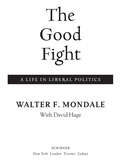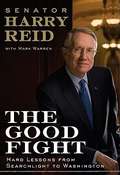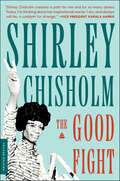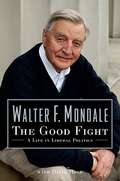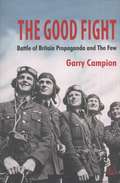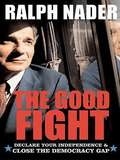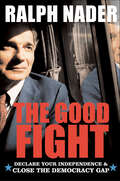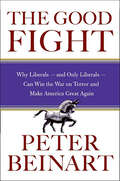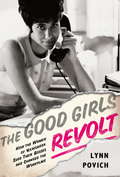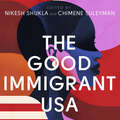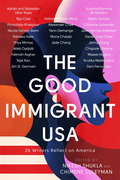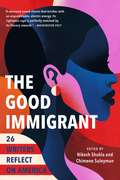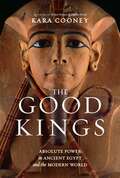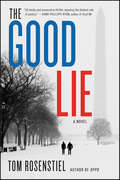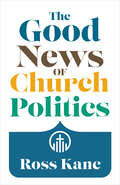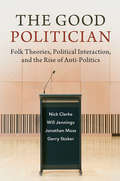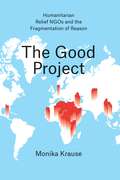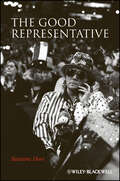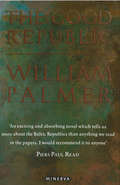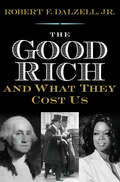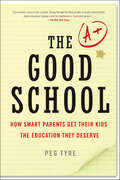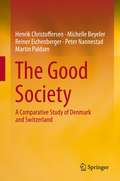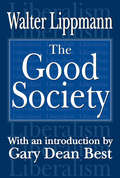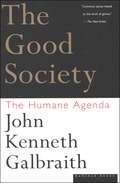- Table View
- List View
The Good Fight
by David Hage Walter MondaleFormer vice president Walter Mondale makes a passionate, timely argument for American liberalism in this revealing and momentous political memoir.For more than five decades in public life, Walter Mondale has played a leading role in America's movement for social change--in civil rights, environmentalism, consumer protection, and women's rights--and helped to forge the modern Democratic Party. In The Good Fight, Mondale traces his evolution from a young Minnesota attorney general, whose mentor was Senator Hubert H. Humphrey, into a U.S. senator himself. He was instrumental in pushing President Johnson's Great Society legislation through Congress and battled for housing equality, against poverty and discrimination, and for more oversight of the FBI and CIA. Mondale's years as a senator spanned the national turmoil of the Nixon administration; its ultimate self-destruction in the Watergate scandal would change the course of his own political fortunes. Chosen as running mate for Jimmy Carter's successful 1976 campaign, Mondale served as vice president for four years. With an office in the White House, he invented the modern vice presidency; his inside look at the Carter administration will fascinate students of American history as he recalls how he and Carter confronted the energy crisis, the Iran hostage crisis, the Soviet invasion of Afghanistan, and other crucial events, many of which reverberate to the present day. Carter's loss to Ronald Reagan in the 1980 election set the stage for Mondale's own campaign against Reagan in 1984, when he ran with Geraldine Ferraro, the first woman on a major party ticket; this progressive decision would forever change the dynamic of presidential elections. With the 1992 election of President Clinton, Mondale was named ambassador to Japan. His intriguing memoir ends with his frank assessment of the Bush-Cheney administration and the first two years of the presidency of Barack Obama. Just as indispensably, he charts the evolution of Democratic liberalism from John F. Kennedy to Clinton to Obama while spelling out the principles required to restore the United States as a model of progressive government. The Good Fight is replete with Mondale's accounts of the many American political heavyweights he encountered as either an ally or as an opponent, including JFK, Johnson, Humphrey, Nixon, Senator Edward M. Kennedy, the Reverend Jesse Jackson, Senator Gary Hart, Reagan, Clinton, and many others. Eloquent and engaging, The Good Fight illuminates Mondale's philosophies on opportunity, governmental accountability, decency in politics, and constitutional democracy, while chronicling the evolution of a man and the country in which he is lucky enough to live.
The Good Fight
by Harry Reid Mark WarrenAfter a childhood of shocking poverty, Harry Reid completed law school, working as a policeman to pay his way. He faced death threats as the head of the Nevada Gaming Commission trying to clean up Las Vegas. Eventually he rose to become Senate Majority Leader in Washington-without ever forgetting the mining town he came from, or the battles he fought along the way. This is that rare book by a politician that is more than a glorified press release. It is an extraordinary American story-told in a voice that is flinty, real, and filled with passion.
The Good Fight
by Shirley ChisholmThe revered civil rights activist and pioneering member of Congress chronicles her groundbreaking 1972 run for President as the first woman and person of color—a work of immense historical importance that both captures and transcends its times, newly reissued to commemorate the fiftieth anniversary of her campaign.“Shirley Chisholm's fearless determination has been an inspiration to so many of us.” —Regina KingBefore Kamala Harris, before Hillary Rodham Clinton there was Shirley Chisholm. In 1972, the Congresswoman from New York—the first Black woman elected to Congress—made history again when she announced her candidacy for President of the United States. Though she understood victory was a longshot, Chisholm chose to run “because someone had to do it first. . . . I ran because most people think the country is not ready for a black candidate, not ready for a woman candidate.” In this invaluable political memoir, Chisholm reflects on her unique campaign and a nation at the crossroads of change. With the striking candor and straightforward style for which she was famous, Chisholm reveals the essential wheeling and dealing inherent to campaigning, castigates the innate conservatism and piety of the Black majority of the period, decries identity politics that lead to destructive power struggles within a fractious Democratic Party, and offers prescient advice on the direction of Black politics. From the whirlwind of the primaries to the final dramatic maneuvering at the tumultuous 1972 Democratic National Convention, The Good Fight is an invaluable portrait of twentieth-century politics and a Democratic Party in flux.Most importantly, The Good Fight is the portrait of a reformer who dedicated her life to making politics work for all Americans. Chisholm saw her campaign as an extension of her political commitment; she ran as an idealist grounded in reality who used her opportunity and position to give voice to all the forgotten. This book bears the stamp of her remarkable personality and her commitment to speaking truth no matter the consequences.Look out for the biopic Shirley, directed by John Ridley and starring Regina King, coming in March 2024.
The Good Fight: A Life in Liberal Politics
by Walter F. Mondale David HageFormer vice president Walter Mondale makes a passionate, timely argument for American liberalism in this revealing and momentous political memoir. For more than five decades in public life, Walter Mondale has played a leading role in America's movement for social change; in civil rights, environmentalism, consumer protection, and women's rights; and helped to forge the modern Democratic Party. In The Good Fight, Mondale traces his evolution from a young Minnesota attorney general, whose mentor was Senator Hubert H. Humphrey, into a U. S. senator himself. He was instrumental in pushing President Johnson's Great Society legislation through Congress and battled for housing equality, against poverty and discrimination, and for more oversight of the FBI and CIA. Mondale's years as a senator spanned the national turmoil of the Nixon administration; its ultimate self-destruction in the Watergate scandal would change the course of his own political fortunes. Chosen as running mate for Jimmy Carter's successful 1976 campaign, Mondale served as vice president for four years. With an office in the White House, he invented the modern vice presidency; his inside look at the Carter administration will fascinate students of American history as he recalls how he and Carter confronted the energy crisis, the Iran hostage crisis, the Soviet invasion of Afghanistan, and other crucial events, many of which reverberate to the present day. Carter's loss to Ronald Reagan in the 1980 election set the stage for Mondale's own campaign against Reagan in 1984, when he ran with Geraldine Ferraro, the first woman on a major party ticket; this progressive decision would forever change the dynamic of presidential elections. With the 1992 election of President Clinton, Mondale was named ambassador to Japan. His intriguing memoir ends with his frank assessment of the Bush-Cheney administration and the first two years of the presidency of Barack Obama. Just as indispensably, he charts the evolution of Democratic liberalism from John F. Kennedy to Clinton to Obama while spelling out the principles required to restore the United States as a model of progressive government. The Good Fight is replete with Mondale's accounts of the many American political heavyweights he encountered as either an ally or as an opponent, including JFK, Johnson, Humphrey, Nixon, Senator Edward M. Kennedy, the Reverend Jesse Jackson, Senator Gary Hart, Reagan, Clinton, and many others. Eloquent and engaging, The Good Fight illuminates Mondale's philosophies on opportunity, governmental accountability, decency in politics, and constitutional democracy, while chronicling the evolution of a man and the country in which he is lucky enough to live.
The Good Fight: Battle of Britain Propaganda and the Few
by Garry CampionPropaganda during the Battle of Britain contributed to high national morale and optimism, with 'The 'Few's' prowess and valour projected through Air Ministry communiqu#65533;s and daily claims 'scores'. The media was a willing partner in portraying their heroism, also later consolidated in wartime publications, films and historiography.
The Good Fight: Declare Your Independence & Close the Democracy Gap
by Ralph NaderReflections of a political independent who has staged two runs for president. Naderwrites about corporate government, civic motivation, campaigning, civil liberties, trial, the multiple party system, and more.
The Good Fight: Declare Your Independence and Close the Democracy Gap
by Ralph NaderStraight talk about George W. Bush,corporate government, and the whole charade of presidential campaigning -- from the last honest man in American politicsRalph Nader -- brilliant visionary, relentless activist -- may be the most honest man left in politics. And yet his presidential campaigns have faced consistent opposition -- mainly from Democrats afraid that competition from an inspiring independent could dent their voting block.Now, in The Good Fight, Nader swings back harder than ever at those who "want to block the American people from having more voices and choices" and have lost touch with the concept that votes must be earned, not inherited or entitled. While taking on corporate-occupied Washington and the government's daily abuse of ordinary citizens, he urges a speedy return to stronger civic motivation. If fed-up citizens don't actively join the fight for better leadership, then ultimately we have no one to blame but ourselves for the inadequate checks on the erosion of our civil liberties.In an era when politicians sell us rhetoric and then sell out our principles, Nader stands as a crucial voice of candor. The Good Fight is a stirring response to politics as usual, one that will captivate readers of all political stripes and help us define what we must do to shape the brightest future for our nation.
The Good Fight: Why Liberals—and Only Liberals—Can Win the War on Terror and Make America Great Again
by Peter BeinartIn this passionate, provocative book, Peter Beinart offers a bold new vision and sounds the call for liberals to revive the spirit that once swept America and inspired the world.
The Good Girls Revolt: How the Women of Newsweek Sued their Bosses and Changed the Workplace
by Lynn PovichIt was the 1960s - - a time of economic boom and social strife. Young women poured into the workplace, but the 'Help Wanted' ads were segregated by gender and the 'Mad Men' office culture was rife with sexual stereotyping and discrimination. <P><P>Lynn Povich was one of the lucky ones, landing a job at Newsweek, renowned for its cutting-edge coverage of civil rights and the 'Swinging Sixties. ' Nora Ephron, Jane Bryant Quinn, Ellen Goodman, and Susan Brown miller all started there as well. It was a top-notch job - - for a girl - - at an exciting place. But it was a dead end. Women researchers sometimes became reporters, rarely writers, and never editors. Any aspiring female journalist was told, 'If you want to be a writer, go somewhere else. ' On March 16, 1970, the day Newsweek published a cover story on the fledgling feminist movement entitled 'Women in Revolt,' forty-six Newsweek women charged the magazine with discrimination in hiring and promotion. It was the first female class action lawsuit - - the first by women journalists - - and it inspired other women in the media to quickly follow suit. <P><P> Lynn Povich was one of the ringleaders. In The Good Girls Revolt, she evocatively tells the story of this dramatic turning point through the lives of several participants. With warmth, humor, and perspective, she shows how personal experiences and cultural shifts led a group of well-mannered, largely apolitical women, raised in the 1940s and 1950s, to challenge their bosses - - and what happened after they did. For many, filing the suit was a radicalizing act that empowered them to 'find themselves' and fight back. Others lost their way amid opportunities, pressures, discouragements, and hostilities they weren't prepared to navigate. <P><P> The Good Girls Revolt also explores why changes in the law didn't solve everything. Through the lives of young female journalists at Newsweek today, Lynn Povich shows what has - - and hasn't - - changed in the workplace.
The Good Immigrant USA: 26 Writers Reflect on America
by Nikesh Shukla Chimene SuleymanGUARDIAN MUST READ BOOKS OF 2019 'The you-gotta-read-this anthology' Stylist'This collection showcases the joy, empathy and fierceness needed to adopt the country as one's own' Publishers Weekly An urgent collection of essays by first- and second-generation immigrants, exploring what it's like to be othered in an increasingly divided America. From Trump's proposed border wall and travel ban to the marching of White Supremacists in Charlottesville, America is consumed by tensions over immigration and the question of which bodies are welcome. In this much-anticipated follow-up to the bestselling UK edition, hailed by Zadie Smith as 'lively and vital', editors Nikesh Shukla and Chimene Suleyman hand the microphone to an incredible range of writers whose humanity and right to be in the US is under attack. Chigozie Obioma unpacks an Igbo proverb that helped him navigate his journey to America from Nigeria. Jenny Zhang analyzes cultural appropriation in nineties fashion, recalling her own pain and confusion as a teenager trying to fit in. Fatimah Asghar describes the flood of memory and emotion triggered by an encounter with an Uber driver from Kashmir. Alexander Chee writes of a visit to Korea that changed his relationship to his heritage. These writers, and the many others in this singular collection, share powerful personal stories of living between cultures and languages while struggling to figure out who they are and where they belong. By turns heartbreaking and hilarious, troubling and uplifting, the essays in The Good Immigrant USA come together to create a provocative, conversation-sparking, multi-vocal portrait of America now.Essays from:Porochista Khakpour; Nicole Dennis-Benn; Rahawa Haile; Teju Cole; Priya Minhas; Walé Oyéjidé; Fatimah Asghar; Tejal Rao; Maeve Higgins; Krutika Mallikarjuna; Jim St. Germain; Jenny Zhang; Chigozie Obioma; Alexander Chee; Yann Demange; Jean Hannah Edelstein; Chimene Suleyman; Basim Usmani; Daniel José Older; Adrián Villar Rojas; Sebastián Villar Rojas; Dani Fernandez; Fatima Farheen Mirza; Susanne Ramírez de Arellano; Mona Chalabi; Jade Chang
The Good Immigrant USA: 26 Writers on America, Immigration and Home
by Nikesh Shukla Chimene SuleymanGUARDIAN MUST READ BOOKS OF 2019 'The you-gotta-read-this anthology' Stylist'This collection showcases the joy, empathy and fierceness needed to adopt the country as one's own' Publishers Weekly An urgent collection of essays exploring what it's like to be othered in an increasingly divided America. From Trump's proposed border wall and travel ban to the marching of White Supremacists in Charlottesville, America is consumed by tensions over immigration and the question of which bodies are welcome. In this much-anticipated follow-up to the bestselling UK edition, hailed by Zadie Smith as 'lively and vital', editors Nikesh Shukla and Chimene Suleyman hand the microphone to an incredible range of writers whose humanity and right to be in the US is under attack. By turns heartbreaking and hilarious, troubling and uplifting, the essays in The Good Immigrant USA come together to create a provocative, conversation-sparking, multi-vocal portrait of America now.Essays from:Porochista Khakpour; Nicole Dennis-Benn; Rahawa Haile; Teju Cole; Priya Minhas; Walé Oyéjidé; Fatimah Asghar; Tejal Rao; Maeve Higgins; Krutika Mallikarjuna; Jim St. Germain; Jenny Zhang; Chigozie Obioma; Alexander Chee; Yann Demange; Jean Hannah Edelstein; Chimene Suleyman; Basim Usmani; Daniel José Older; Adrián Villar Rojas; Sebastián Villar Rojas; Dani Fernandez; Fatima Farheen Mirza; Susanne Ramírez de Arellano; Mona Chalabi; Jade Chang
The Good Immigrant: 26 Writers Reflect on America
by Nikesh Shukla Chimene SuleymanAn urgent collection of essays by first and second-generation immigrants, exploring what it's like to be othered in an increasingly divided America. <P><P>From Trump's proposed border wall and travel ban to the marching of White Supremacists in Charlottesville, America is consumed by tensions over immigration and the question of which bodies are welcome. In this much-anticipated follow-up to the bestselling UK edition, hailed by Zadie Smith as "lively and vital," editors Nikesh Shukla and Chimene Suleyman hand the microphone to an incredible range of writers whose humanity and right to be here is under attack. <P><P> Chigozie Obioma unpacks an Igbo proverb that helped him navigate his journey to America from Nigeria. Jenny Zhang analyzes cultural appropriation in 90s fashion, recalling her own pain and confusion as a teenager trying to fit in. Fatimah Asghar describes the flood of memory and emotion triggered by an encounter with an Uber driver from Kashmir. Alexander Chee writes of a visit to Korea that changed his relationship to his heritage. These writers, and the many others in this singular collection, share powerful personal stories of living between cultures and languages while struggling to figure out who they are and where they belong. By turns heartbreaking and hilarious, troubling and uplifting, the essays in The Good Immigrant come together to create a provocative, conversation-sparking, multivocal portrait of America now.
The Good Kings: Absolute Power in Ancient Egypt and the Modern World
by Kara CooneyWritten in the tradition of historians like Mary Beard and Stacy Schiff who find modern lessons in ancient history, this provocative narrative explores the lives of five remarkable pharaohs who ruled Egypt with absolute power, shining a new light on the country's 3,000-year empire and its meaning today. In a new era when democracies around the world are threatened or crumbling, best-selling author Kara Cooney turns to five ancient Egyptian pharaohs--Khufu, Senwosret III, Akenhaten, Ramses II, and Taharqa--to understand why many so often give up power to the few, and what it can mean for our future. As the first centralized political power on earth, the pharaohs and their process of divine kingship can tell us a lot about the world's politics, past and present. Every animal-headed god, every monumental temple, every pyramid, every tomb, offers extraordinary insight into a culture that combined deeply held religious beliefs with uniquely human schemes to justify a system in which one ruled over many.From Khufu, the man who built the Great Pyramid at Giza as testament to his authoritarian reign, and Taharqa, the last true pharaoh who worked to make Egypt great again, we discover a clear lens into understanding how power was earned, controlled, and manipulated in ancient times. And in mining the past, Cooney uncovers the reason why societies have so willingly chosen a dictator over democracy, time and time again.
The Good Lie: A Novel
by Tom RosenstielAn intelligent and propulsive international political thriller in which political fixer Peter Rena is hired by the president to investigate the bombing of an American military base overseasWhen a shadowy American diplomatic complex is attacked in North Africa, the White House is besieged by accusations of incompetence and wild conspiracy theories. Eager to learn the truth, the president and his staff turn to Peter Rena and his partner, Randi Brooks. The investigators dive headfirst into the furtive world of foreign intelligence and national security, hoping to do it quietly. That becomes impossible, though, when it blows up into an all-out public scandal: Congress opens hearings and a tireless national security reporter publishes a bombshell exposé. Now, Rena and Brooks are caught in the middle. The White House wants to prevent debilitating fallout for the president, the military appears to be in shutdown mode, the press is hungry for another big story, and rival politicians are plotting their next move. Rena learns the hard way that secrets in Washington come with a very high price. With intelligence, style, and a breakneck pace, The Good Lie explores the contours of secrets, lies, and the dangers of a never-ending war.Praise for Shining City:“One of the smartest thrillers in recent memory.” —Dallas Morning News“A debut that will be remembered for years.” —Michael Connelly“Skillful and memorable.” —Wall Street Journal
The Good Neighbour
by Bob BreenThe Good Neighbour explores the Australian government's efforts to support peace in the Pacific Islands from 1980 to 2006. It tells the story of the deployment of Australian diplomatic, military and policing resources at a time when neighbouring governments were under pressure from political violence and civil unrest. The main focus of this volume is Australian peacemaking and peacekeeping in response to the Bougainville Crisis, a secessionist rebellion that began in late 1988 with the sabotage of a major mining operation. Following a signed peace agreement in 2001, the crisis finally ended in December 2005, under the auspices of the United Nations. During this time Australia's involvement shifted from behind-the-scenes peacemaking, to armed peacekeeping intervention, and finally to a longer-term unarmed regional peacekeeping operation. Granted full access to all relevant government files, Bob Breen recounts the Australian story from decisions made in Canberra to the planning and conduct of operations.
The Good News of Church Politics
by Ross KaneRethinking politics in the light of God When we think about politics we often think about the privileged vying for power. Alternatively, we might think about gridlock, about frustration, or about how little our voices seem to matter. Our obsession with statecraft can both paralyze us and lead us to duplicate the tactics of this exasperating form of politics when we lead our church communities. Ross Kane has good news for us: church politics doesn&’t have to work this way! In fact, it can even become a spiritual practice. Drawing on his work as a pastor in the DC area, Kane shows how localized action by churches can make a real difference in their neighborhoods. Kane combines Scripture, political theology, and personal experience to reframe politics around shaping our common life. From community service to advocacy, congregations can practice politics in ways that embrace our loving interdependence as members of the body of Christ. Church leaders, whether lay or clerical, will find The Good News of Church Politics an uplifting guide to modeling God&’s reign in our world by loving our neighbors.
The Good Politician: Folk Theories, Political Interaction, and the Rise of Anti-Politics
by Nick Clarke Gerry Stoker Will Jennings Jonathan MossSurveys show a lack of trust in political actors and institutions across much of the democratic world. Populist politicians and parties attempt to capitalise on this political disaffection. Commentators worry about our current 'age of anti-politics'. <P><P>Focusing on the United Kingdom, using responses to public opinion surveys alongside diaries and letters collected by Mass Observation, this book takes a long view of anti-politics going back to the 1940s. This historical perspective reveals how anti-politics has grown in scope and intensity over the last half-century. Such growth is explained by citizens' changing images of 'the good politician' and changing modes of political interaction between politicians and citizens. Current efforts to reform and improve democracy will benefit greatly from the new evidence and conceptual framework set out in this important study.<P> Presents new evidence and analysis of rising political disaffection in the United Kingdom.<P> Provides a new conceptual framework in which to view citizens' judgements of politics.<P> Informs current debates on democratic reform.
The Good Project: Humanitarian Relief NGOs and the Fragmentation of Reason
by Monika KrauseNGOs set out to save lives, relieve suffering, and service basic human needs. They are committed to serving people across national borders and without regard to race, ethnicity, gender, or religion, and they offer crucial help during earthquakes, tsunamis, wars, and pandemics. But with so many ailing areas in need of assistance, how do these organizations decide where to go—and who gets the aid? In The Good Project, Monika Krause dives into the intricacies of the decision-making process at NGOs and uncovers a basic truth: It may be the case that relief agencies try to help people but, in practical terms, the main focus of their work is to produce projects. Agencies sell projects to key institutional donors, and in the process the project and its beneficiaries become commodities. In an effort to guarantee a successful project, organizations are incentivized to help those who are easy to help, while those who are hardest to help often receive no assistance at all. The poorest of the world are made to compete against each other to become projects—and in exchange they offer legitimacy to aid agencies and donor governments. Sure to be controversial, The Good Project offers a provocative new perspective on how NGOs succeed and fail on a local and global level.
The Good Representative (New Directions in Ethics #8)
by Suzanne DoviIn The Good Representative, Suzanne Dovi argues that democratic citizens should assess their representatives by their display of three virtues: they must be fair-minded, build critical trust, and be good gatekeepers. This important book provides standards for evaluating the democratic credentials of representatives. Identifies the problems with and obstacles to good democratic representation. Argues that democratic representation, even good democratic representation, is not always desirable. Timely and original, this book rejects the tendency to equate respect for the preferences of citizens with neutrality on the standards used in choosing their representatives.
The Good Republic
by William PalmerOpening in 1939, this novel spans 50 years and depicts the central character's life as a political emigre in a run down part of London. He is invited to return to his home city by the renascent nationalist movement where he learns the price of remaining an "innocent" in history.
The Good Rich and What They Cost Us
by Robert F. Dalzell Jr.This timely book holds up for scrutiny a great paradox at the core of the American Dream: a passionate belief in the principle of democracy combined with an equally passionate celebration of the creation of wealth. Americans treasure an open, equal society, yet we also admire those fortunate few who amass riches on a scale that undermines social equality. In today's era of "vulture capitalist" hedge fund managers, internet fortunes, and a growing concern over inequality in American life, should we cling to both parts of the paradox? Can we? To understand the problems that vast individual fortunes pose for democratic values, Robert Dalzell turns to American history. He presents an intriguing cast of wealthy individuals from colonial times to the present, including George Washington, one of the richest Americans of his day, the "robber baron" John D. Rockefeller, and Oprah Winfrey, for whom extreme wealth is inextricably tied to social concerns. Dalzell uncovers the sources of contradictory attitudes toward the rich, how the very rich have sought to be perceived as "good rich," and the facts behind the widespread notion that wealth and generosity go hand in hand. In a thoughtful and balanced conclusion, the author explores the cost of our longstanding attitudes toward the rich. Among the case studies in America's Good Rich:Puritan merchant Robert KeayneGeorge WashingtonManufacturers Amos & Abbot LawrenceOil magnate John D. RockefellerBill GatesWarren BuffetSteve JobsOprah Winfrey
The Good School: How Smart Parents Get Their Kids the Education They Deserve
by Peg TyreAward-winning education journalist Peg Tyre mines up-to-the-minute research to equip parents with the tools and knowledge necessary to get their children the best education possibleWe all know that the quality of education served up to our children in U.S. schools ranges from outstanding to shockingly inadequate. How can parents tell the difference? And how do they make sure their kids get what's best? Even the most involved and informed parents can feel overwhelmed and confused when making important decisions about their child's education. And the scary truth is that evaluating a school based on test scores and college admissions data is like selecting a car based on the color of its paint. Synthesizing cutting-edge research and firsthand reporting, Peg Tyre offers parents far smarter and more sophisticated ways to assess a classroom and decide if the school and the teacher have the right stuff. Passionate and persuasive, The Good School empowers parents to make sense of headlines; constructively engage teachers, administrators, and school boards; and figure out the best option for their child—be that a local public school, a magnet program, a charter school, homeschooling, parochial, or private.
The Good Society
by Henrik Christoffersen Michelle Beyeler Reiner Eichenberger Peter Nannestad Martin PaldamDenmark and Switzerland are small and successful countries with exceptionally content populations. However, they have very different political institutions and economic models. They have followed the general tendency in the West toward economic convergence, but both countries have managed to stay on top. They both have a strong liberal tradition, but otherwise their economic strategies are a welfare state model for Denmark and a safe haven model for Switzerland. The Danish welfare state is tax-based, while the expenditures for social welfare are insurance-based in Switzerland. The political institutions are a multiparty unicameral system in Denmark, and a permanent coalition system with many referenda and strong local government in Switzerland. Both approaches have managed to ensure smoothly working political power-sharing and economic systems that allocate resources in a fairly efficient way. To date, they have also managed to adapt the economies to changes in the external environment with a combination of stability and flexibility.
The Good Society
by Walter LippmannThe Good Society is a critical text in the history of liberalism. Initially a series of articles published in a variety of Lippmann's favorite magazines, as the whole evolved, it became a frontal assault against totalitarian tendencies within American society. Lippmann took to task those who sought to improve the lot of mankind by undoing the work of their predecessors and by undermining movements in which men struggle to be free. This book is a strong indictment of programs of reform that are at odds with the liberal tradition, and it is critical of those who ask people to choose between security and liberty.The Good Society falls naturally into two segments. In the first, Lippmann shows the errors and common fallacies of faith in government as the solution to all problems. He says, "from left to right, from communist to conservative. They all believe the same fundamental doctrine. All the philosophies go into battle singing the same tune with slightly different words." In the second part of the book, Lippmann offers reasons why liberalism lost sight of its purpose and suggests the first principles on which it can flourish again.Lippmann argues that liberalism's revival is inevitable because no other system of government can work, given the kind of economic world mankind seeks. He did not write The Good Society to please adherents of any political ideology. Lippmann challenges all philosophies of government, and yet manages to present a positive program. Bewildered liberals and conservatives alike will find this work a successful effort to synthesize a theory of liberalism with the practice of a strong democracy. Gary Dean Best has provided the twenty-first century reader a clear-eyed context for interpreting Lippmann's defense of classical liberalism.The Good Society is the eleventh in a series of books written by Walter Lippmann reissued by Transaction with new introductions and in a paperback format. As
The Good Society: The Human Agenda (Las Letras De Drakontos Ser.)
by John Kenneth GalbraithThe legendary economist explains how a nation can remain both compassionate and fiscally sound, with &“common sense raised to the level of genius&” (The New Yorker). This compact, eloquent book offers a blueprint for a workable national agenda that allows for human weakness without compromising a humane culture. Arguing that it is in the best interest of the United States to avoid excessive wealth and income inequality, and to safeguard the well-being of its citizens, he explores how the goal of a good society can be achieved in an economically feasible way. Touching on topics from regulation, inflation, and deficits to education, the environment, bureaucracy, and the military, Galbraith avoids purely partisan or rigid ideological politics—instead addressing practical problems with logic and well-thought-out principles. &“Carefully reasoned . . . the pragmatically liberal Galbraith [argues] that both socialism and complete surrender to market forces are irrelevant as guides to public action.&” —Publishers Weekly
